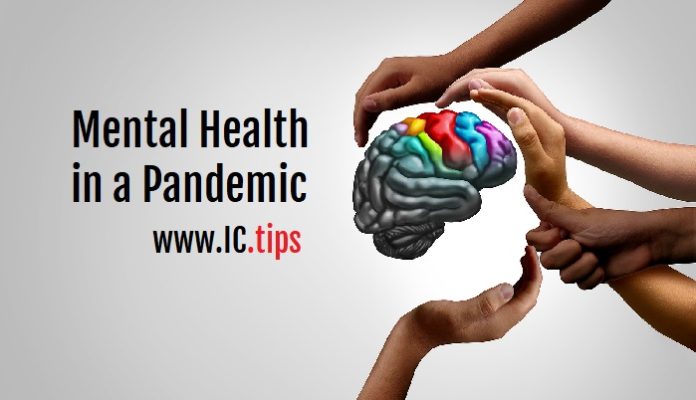Abstract
Mental health is not simply the absence of a diagnosed mental disorder but is a measure of overall health that includes the ability to cope with everyday life and to contribute meaningfully to society. The COVID-19 pandemic has both exacerbated existing mental health issues and has affected the mental health of many adults and youth for the first time. “There is no health without mental health” (Mental, 2018), and as such it is imperative that we both recognize when someone is struggling and provide supports to improve their overall well-being.
Introduction
When considering the health and well-being of individuals, mental health must not be forgotten; the COVID-19 pandemic has caused serious fluctuations in cases of poor mental health globally. Both those with pre-existing mental health issues and those who have never displayed any symptoms are experiencing heightened anxiety, depression, fear, helplessness, and agitation. In a 2020 article, Khan et al. emphasize how the rising prevalence and distribution of mental health issues are disproportionately affecting children.
What is Mental Health?
As defined by The World Health Organization (WHO), mental health is “a state of well-being in which an individual realizes [their] own abilities, can cope with the normal stresses of life, can work productively and is able to make a contribution to [their] community.” (Mental, 2018) More than merely the absence of a diagnosed mental illness, mental health considers a range of socioeconomic, environmental, and biological factors. Within the frame of mental health there are six primary psychological composing elements (Mukhtar, 2020):
- Self-Acceptance
- Meaning in Life
- Autonomy
- Healthy Interpersonal Relationships
- Environmental Mastery
- Personal Growth
Due to numerous factors concerning the COVID-19 pandemic, these six elements of mental health are put at risk (Khan et al., 2020). Currently, for children aged 10 – 14, suicide is the leading cause of death (Raising Canada, 2020, pp.16-17); and for those aged 15-24, it is the second leading cause of death.
Studies support the notion that mental health in youth, including depressive and anxiety symptoms, is worsening during the pandemic (Raising Canada, 2020, p.18). Recent crowdsourced data shows that the mental health of 57% of youth aged 15- 17 had worsened following measures of social distancing (p.18). Similarly, StatsCan released survey results showing a 20% decrease in mental health during the pandemic compared to in 2018 for those aged 15-24. During the pandemic, calls to Kids Help Phone have shown a significant increase, suggesting struggles with mental health among children (p.18).
Why the Increase?
Reasons for the increase in poor mental health linked to the ongoing pandemic include fear of infection, fear of death, self-isolation, social discord, economic discord, and misinformation (Khan et al., 2020).
Many studies have found that the pandemic has also increased cases of domestic and family violence (Raising Canada, 2020, p.20), which is undoubtedly a contributor to poor mental health and well-being. The symptom of aggression has become common throughout different cohorts during COVID-19. This increase may be the result of increased loneliness, fear, and/or isolation, and contributes to rises in domestic violence.
Disproportionate Distribution
Rising cases of COVID-19 in Canada are having harmful and serious effects on the mental well-being of youth in specific. Canadian children are experiencing the adverse impacts of increased poverty, an increased risk of violence at home, and detriments to mental health (City News). When interviewed, children reported that not being able to see friends is a factor in their deteriorating state of mental health. When youth aged 10-17 were asked to provide words that described their mood and feelings over the prior weeks, a staggering 70% responded that they felt bored (Raising Canada, 2020, p.18). The word “loneliness” was the third most used. The results of this survey indicate that most of the six psychological elements of mental health and well-being are at risk of not being met. More than half of the children said that the worst part of staying at home was the lack of time with friends, which makes sense as their need to fulfill healthy relationships with others is made far more complicated.
Our Role in Social Change
Society has been emphasizing support for those struggling with mental health through social media platforms. To move this initiative beyond its performative form, the criticality of the situation amongst struggling children must be addressed. The first step is to be there for those around you and to recognize when someone is struggling and needs support.
The top ten threats to children in Canada from Raising Canada (2020) ought to be the areas to which social change is targeted. These threats are in exasperated by the COVID-19 pandemic but will require ongoing attention even after the threat of the virus has passed. The threats are:
-
-
- Unintentional and preventable injuries
- Poor mental health
- Child abuse
- Poverty
- Infant mortality
- Physical inactivity
- Food insecurity
- Systemic racism and discrimination
- Vaccine-preventable illnesses
- Bullying
-
Furthermore, according to Khan et al. (2020), the spread of misinformation needs to halt in order to prevent elevated fear throughout global populations. Those who are struggling with mental health issues need to be supported within our healthcare systems, as well as in broader society, to address the crisis at hand. For our children, it is imperative that we talk to them about how they are feeling and to understand how the pandemic has affected their mental well-being. Providing them with accurate information and monitoring the information they are receiving through social media will go a long way in breaking through any misinformation and easing their minds about the virus.
What this Means for Organizations Like TIPS
The distribution of accurate information during a crisis moment such as COVID-19 is critical. Thanks to TIPS and similar organizations, this information is accessible to anyone at no cost. As consumers of media, it is crucial that we all seek accurate information from reputable sources for the sake of our mental well-being.
References
(2020, September 01). Retrieved June 21, 2021, from https://toronto.citynews.ca/video/2020/09/01/covid-19-impacting-mental-health-of-canadian-children/
Khan, K. S., Mamun, M. A., Griffiths, M. D., & Ullah, I. (2020). The Mental Health Impact of the COVID-19 Pandemic Across Different Cohorts. International Journal of Mental Health and Addiction. doi:10.1007/s11469-020-00367-0
Mental health: strengthening our response (2018, March 30). World Health Organization, https://www.who.int/news-room/fact-sheets/detail/mental-health-strengthening-our-response
Top 10 Threats to Childhood in Canada and The Impact of COVID-19 (Rep.). (2020, September). Retrieved https://static1.squarespace.com/static/5669d2da9cadb69fb2f8d32e/t/5f51503d5ceab254db134729/1599164484483/Raising Canada Report_Final_Sept.pdf












